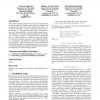102
click to vote
CORR
1998
Springer
15 years 1 months ago
1998
Springer
: We consider the common-knowledge paradox raised in [HM90]: common knowledge is necessary for coordination, but common knowledge is unattainable in the real world because of tempo...
102
click to vote
JAPLL
2007
15 years 1 months ago
2007
Starting off from the infinitary system for common knowledge over multi-modal epistemic logic presented in Alberucci and J¨ager [1], we apply the finite model property to “�...
129
click to vote
APAL
2005
15 years 2 months ago
2005
The notions of common knowledge or common belief play an important role in several areas of computer science (e.g. distributed systems, communication), in philosophy, game theory,...
135
click to vote
SYNTHESE
2008
15 years 2 months ago
2008
Dynamic Epistemic Logic (DEL) is the study of how to reason about knowledge, belief, and communication. This paper studies the relative expressivity of certain fragments of the DE...
118
click to vote
SLOGICA
2008
15 years 2 months ago
2008
Sharvy's puzzle concerns a situation in which common knowledge of two parties is obtained by repeated observation each of the other, no fixed point being reached in finite ti...
124
click to vote
CORR
2007
Springer
15 years 2 months ago
2007
Springer
Common knowledge logic is meant to describe situations of the real world where a group of agents is involved. These agents share knowledge and make strong hypotheses on the knowled...
104
click to vote
ENTCS
2010
15 years 2 months ago
2010
It is not clear what a system for evidence-based common knowledge should look like if common knowledge is treated as a greatest fixed point. This paper is a preliminary step towar...
102
click to vote
ECSCW
2007
15 years 3 months ago
2007
Abstract. We show that asynchronous collaboration can be made more effective by providing cues to common knowledge. We demonstrate this by empirically comparing two user interfaces...
102
click to vote
ATAL
2008
Springer
15 years 4 months ago
2008
Springer
Some natural epistemic properties which may arise in applications can only be expressed in standard epistemic logic by formulae which are exponentially long in the number of agent...
AAAI
2007
15 years 4 months ago
2007
There are a number of frameworks for modelling argumentation in logic. They incorporate a formal representation of individual arguments and techniques for comparing conflicting a...

